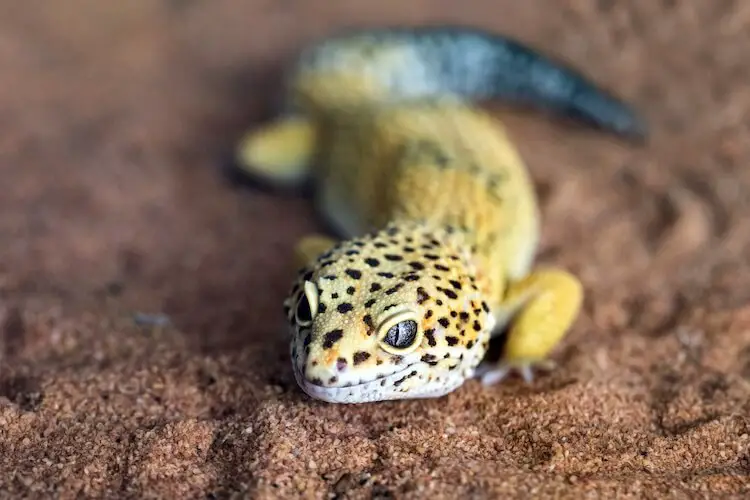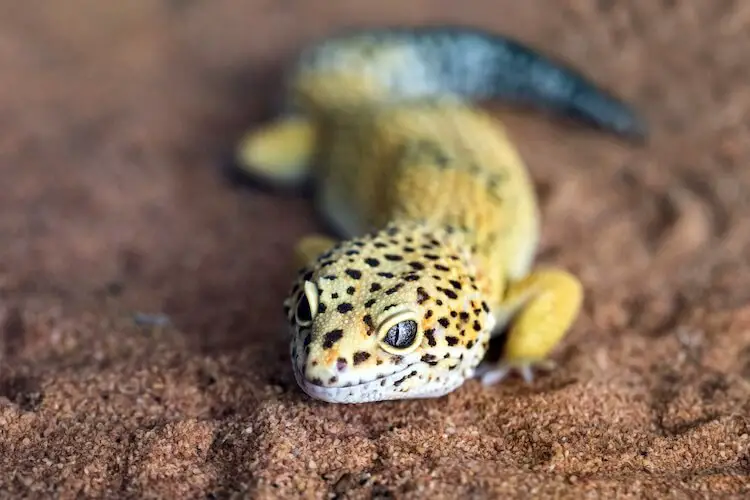Gecko lizards are fascinating creatures that are known for their unique characteristics. One of the most commonly asked questions about gecko lizards is how long they live. Understanding the lifespan of these creatures can help owners provide better care and make informed decisions about their pets.
Gecko lizards are a popular choice for reptile enthusiasts due to their quirky personalities and interesting physical features. However, many people are unaware of the average lifespan of these creatures. In this article, we will explore the factors that influence the lifespan of gecko lizards and provide valuable insights on how to ensure that your pet lives a long and healthy life.

How Long Do Gecko Lizards Live?
Gecko lizards are fascinating creatures that are popular pets due to their unique appearance and low maintenance requirements. They come in various sizes and colors, with different species having varying lifespans. In this article, we will explore the lifespan of gecko lizards and what factors can affect their longevity.
1. Average Lifespan of Gecko Lizards
Gecko lizards can live for several years in captivity, with some species living longer than others. The average lifespan of a gecko lizard is around 6-10 years, but some can live up to 20 years or more. The lifespan of a gecko is influenced by various factors, including genetics, diet, habitat, and overall health.
Geckos that are well-cared for and provided with a favorable environment will generally live longer than those that are neglected or kept in unsuitable conditions. Factors that can negatively impact a gecko’s lifespan include stress, poor nutrition, lack of exercise, and exposure to harmful chemicals.
To ensure your gecko lives a long and healthy life, it is essential to provide them with an appropriate diet, clean living environment, and regular veterinary check-ups.
2. Factors that Affect Gecko Lifespan
There are several factors that can affect the lifespan of a gecko lizard. Genetics play a significant role in determining how long a gecko will live. Some species, such as the leopard gecko, are known to live longer than others.
The diet is another vital factor that can affect the lifespan of a gecko. A balanced diet that includes live insects and a variety of fruits and vegetables can help ensure that your gecko receives all the necessary nutrients to maintain good health.
The living environment is also crucial to a gecko’s lifespan. Geckos require a temperature-controlled habitat with appropriate lighting and humidity levels. A well-maintained living space can help prevent illness and disease, which can significantly reduce a gecko’s lifespan.
3. Benefits of Owning a Gecko Lizard
Gecko lizards make great pets due to their unique appearance, low maintenance requirements, and quiet nature. They are an excellent choice for first-time reptile owners and families with children.
Geckos are fascinating creatures to observe and can provide hours of entertainment with their quirky behavior and acrobatic movements. They are also relatively low maintenance, requiring minimal attention compared to other pets.
If you are considering getting a gecko lizard as a pet, be sure to research the specific species you are interested in to ensure you can provide the appropriate care and environment for them.
4. Gecko Vs. Other Reptile Lifespans
When compared to other reptiles, gecko lizards have a relatively long lifespan. While some species of turtles and tortoises can live up to 100 years or more, most common pet reptiles, such as snakes and lizards, have shorter lifespans.
For example, the average lifespan of a ball python is around 20-30 years, while the bearded dragon’s lifespan is around 8-12 years. If you are looking for a pet reptile that will be a long-term companion, a gecko lizard may be a great choice.
5. Caring for Your Gecko Lizard
Caring for a gecko lizard is relatively easy, but it does require some specific knowledge and equipment. Here are some essential tips for caring for your gecko:
– Provide a temperature-controlled habitat with appropriate lighting and humidity levels
– Feed a balanced diet of live insects and fruits and vegetables
– Keep the living environment clean and free of harmful chemicals
– Provide fresh water daily
– Handle your gecko gently and avoid stressing them out
By following these simple guidelines, you can help ensure that your gecko lizard lives a long and healthy life.
6. Common Health Issues in Gecko Lizards
Gecko lizards are generally hardy creatures, but they are susceptible to several health issues that can affect their lifespan. Some common health problems in geckos include:
– Metabolic bone disease
– Respiratory infections
– Parasites
– Skin infections
To prevent these health issues, it is essential to provide your gecko with a clean living environment, a balanced diet, and regular veterinary check-ups. If you notice any signs of illness or disease in your gecko, such as lethargy, loss of appetite, or difficulty breathing, seek veterinary care immediately.
7. Breeding and Reproduction
Many gecko species are relatively easy to breed in captivity, and breeding can be a rewarding experience for pet owners. However, breeding geckos requires specific knowledge and equipment, and should only be attempted by experienced reptile owners.
Geckos typically reach sexual maturity between 6-18 months of age, depending on the species. Mating usually occurs during the breeding season, which varies depending on the species and geographic location.
Geckos lay eggs, with the number of eggs and incubation time varying depending on the species. It is essential to provide appropriate nesting boxes and temperature-controlled incubation for successful breeding.
8. Gecko Lizards in the Wild
Gecko lizards are found in various habitats worldwide, from tropical rainforests to deserts. They are primarily nocturnal creatures, and many species have unique adaptations that allow them to climb, glide, and camouflage themselves from predators.
In the wild, geckos face various threats, including habitat loss, climate change, and predation by other animals. Many species of geckos are also in danger of extinction due to human activity.
By learning about and appreciating gecko lizards, we can help protect these fascinating creatures and their habitats.
9. Conclusion
Gecko lizards are unique and fascinating creatures that make great pets. With proper care and maintenance, they can live for many years and provide endless entertainment and enjoyment.
Factors that can affect a gecko’s lifespan include genetics, diet, living environment, and overall health. By providing a healthy habitat, a balanced diet, and regular veterinary care, you can help ensure that your gecko lizard lives a long and healthy life.
If you are considering getting a gecko lizard as a pet, be sure to research the specific species you are interested in and seek advice from experienced reptile owners or veterinarians.
10. References
– https://www.thesprucepets.com/leopard-geckos-as-pets-1237250
– https://www.petmd.com/reptile/care/evr_rp_gecko_care
– https://www.nationalgeographic.com/animals/reptiles/facts/gecko
– https://www.reptifiles.com/lizard-care-sheets/gecko-care-sheet/
Frequently Asked Questions
Geckos are fascinating lizards that are popular as pets. One common question that many people have is how long they can expect their pet gecko to live. Here are some answers to the most frequently asked questions about the lifespan of gecko lizards.
How long do gecko lizards typically live?
Gecko lizards can live for several years, with the exact lifespan depending on the species. Some species only live for a few years, while others can live for up to 20 years or more. The care that a gecko receives throughout its life can also have an impact on its lifespan.
Factors such as diet, temperature, humidity, and living conditions can all affect how long a gecko lives. Proper care and attention can help ensure that a gecko lives a long, healthy life, while neglect or poor care can lead to a shorter lifespan.
How can I help my gecko live a long life?
To help your gecko live a long and healthy life, it’s important to provide it with a suitable habitat and diet. Make sure that the temperature and humidity levels in your gecko’s enclosure are appropriate for its species, and that it has access to fresh water and a variety of nutritious foods.
Regular veterinary checkups can also help ensure that your gecko remains healthy and free from disease. Finally, be sure to handle your gecko gently and avoid stressing it out, as stress can have a negative impact on its health and lifespan.
What are some signs that my gecko may be sick?
Geckos can be prone to a variety of illnesses and health problems, so it’s important to be aware of the signs that something may be wrong. Some common signs of illness in geckos include lethargy, loss of appetite, weight loss, respiratory problems, and skin abnormalities.
If you notice any of these symptoms in your gecko, it’s important to seek veterinary care right away. Early diagnosis and treatment can help improve your gecko’s chances of recovering from an illness and living a long, healthy life.
Can geckos live together in the same enclosure?
While some species of geckos can coexist peacefully in the same enclosure, it’s generally not recommended to keep multiple geckos together. Geckos can be territorial, and keeping them together can lead to aggression and fighting.
If you do decide to keep multiple geckos together, make sure that the enclosure is large enough to accommodate them all comfortably, and that each gecko has access to its own hiding spots and food sources. It’s also important to monitor the geckos closely for any signs of aggression or stress.
What should I do if my gecko stops eating or drinking?
If your gecko stops eating or drinking, it’s important to seek veterinary care right away. Loss of appetite can be a sign of illness or other health problems, and dehydration can quickly become a serious issue in reptiles.
While you’re waiting for veterinary care, make sure that your gecko has access to fresh water and a warm, comfortable environment. You may also want to try offering your gecko a variety of different foods to see if it will start eating again.
DO NOT GET A LEOPARD GECKO | Get These Lizards Instead!
In conclusion, gecko lizards have an average lifespan of 6 to 10 years in captivity. However, some species have been known to live up to 20 years in the wild. Factors such as diet, habitat, and genetics play a significant role in determining the lifespan of a gecko lizard.
It is important to provide your gecko with a balanced diet, a suitable habitat, and proper care to ensure they live a long and healthy life. Regular visits to the veterinarian can also help catch any potential health issues early on.
Overall, gecko lizards are fascinating creatures that can make great pets for those willing to provide them with the care and attention they need. Understanding their lifespan and how to care for them can help ensure a happy and healthy life for your gecko.


